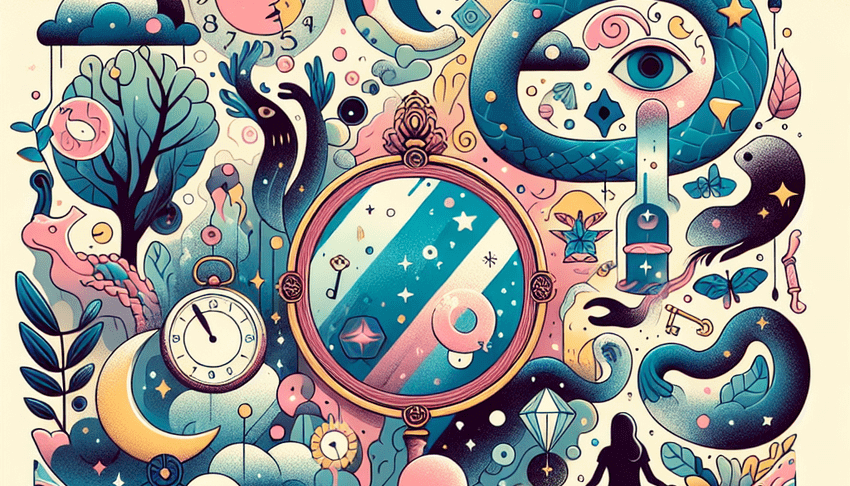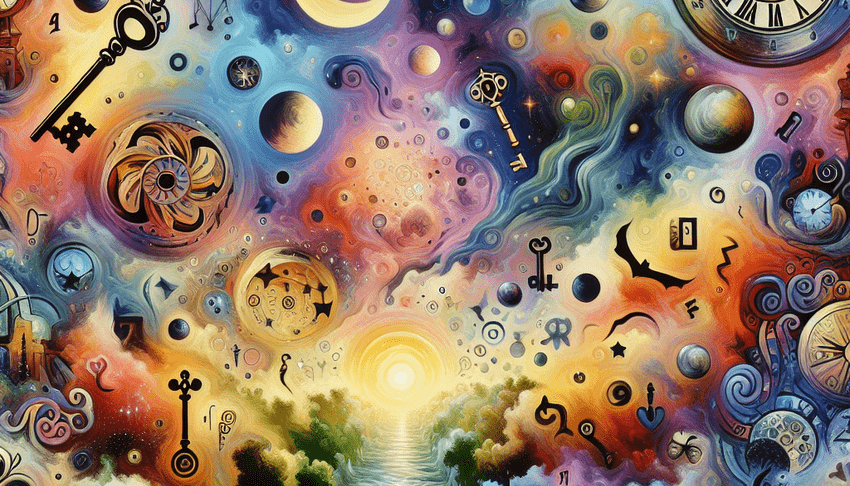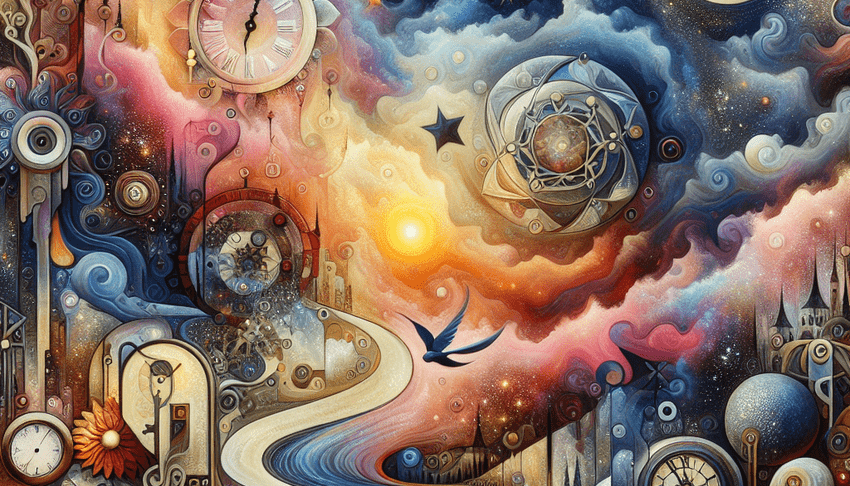Table of Contents
Mirrors in Dreams – Gateway to Self-Reflection

Symbolic Representations of Mirrors in Dreams
Analyzing the myriad symbolic representations of mirrors in dreams opens a window into our own psyche. Mirrors in dreams often symbolize self-examination, introspection, and the depths of our subconscious. They invite us to contemplate our innermost thoughts, fears, and desires. When we gaze into a mirror within the dream world, we’re not just seeing our physical reflection but are also being prompted to reflect on our identity, self-perception, and the parts of ourselves we might be hiding or confronting.
Reflection and Recognition
Encountering mirrors and reflections in dreams can be a profound experience. If we see our reflection, it could signify an acknowledgment of our true self or perhaps an aspect we are finally coming to terms with. Conversely, an inability to see one’s reflection might imply a loss of identity or a fear of confronting the self. It raises questions about authenticity and what may be lurking beneath the surface of our presented selves.
- One individual dreamt of seeing not himself, but a stranger in the mirror, leading to a realization of disconnect from his own desires and a need to rediscover his true passions.
- Another reported a dream where the mirror was shattered—a classic symbol of disrupted self-image or a call for change.
Depth of Self-Awareness
Mirrors in dreams also measure the depth of our self-awareness. Dreams where mirrors play a central role can be especially revealing about our inner state. If you are seeing yourself clearly and accurately, it might indicate a moment of clarity and understanding in your waking life. However, distorted images or a refusal to look can represent denial or self-deception.
- For example, a person struggling with self-acceptance might dream of a foggy mirror that fails to reflect anything at all—a symbolic representation of their current emotional limbo.
Symbolism and Growth
The symbolism of mirrors in dreams extends not just to personal contemplation but also to how we perceive others and the world around us. The reflections we see can shape our reactions and interactions in our waking lives. Dreams whereby one cleans a dirty mirror may suggest a desire for clarity and truth in relationships, while a mirror that reveals something unexpected can symbolize new insights or hidden truths coming to light.
- In one case, a woman’s dream involved a mirror reflecting a childhood room, unlocking memories and associated emotions that were pivotal for her personal growth.
Interpreting mirrors and reflections in dreams is not a one-size-fits-all exercise. The rich symbolism and individual circumstances of the dreamer interweave to create a unique tapestry of meaning. By paying attention to the nuances of these mirror dreams, we can gain profound insights into our emotional intelligence and the evolution of our personal journey. Each dream serves as both a mirror and a window—reflecting who we are and hinting at the potential of who we might become.
Shattered Reflections – Symbols of Inner Conflict
Mirrors in dreams often act as gateways to the inner self, reflecting not just our physical appearance but our mental state and subconscious thoughts. When these mirrors are shattered or distorted, they can symbolize internal conflict or identity crises. Interpreting mirrors and reflections in dreams can unlock a deeper understanding of our emotions and the challenges we are confronting.
Symbolism of Broken Mirrors
According to dream interpretation theories, a fractured mirror may represent a fragmented self-image or a period of upheaval in one’s life. The cracks in the mirror suggest that the dreamer’s perception of self is not whole, indicating uncertainties, self-criticism, or even a fear of self-knowledge. Interpreting mirrors and reflections in dreams requires an investigation of the personal circumstances that might have led to this mental imagery.
- Stressful life events can lead to dreams of broken mirrors, as they echo the chaos in the dreamer’s waking life.
- Personal losses and trauma might cause one’s self-view to splinter, metaphorically represented by the shattered glass.
- Conflicting values or a dissonance between one’s actions and beliefs are common sources of internal discord, often surfacing through dream symbolism.
Distorted Reflections and Anxieties
Reflection symbolism also extends to distorted images in mirrors. When one’s reflection is twisted or altered in a dream, it might suggest anxiety about how one is perceived by others or an internal struggle with self-acceptance. It may also point to an identity or role that the dreamer is being pressured to assume, which does not align with their true self.
- A distorted reflection could depict the anxiety of aging or changing physically.
- For those experiencing imposter syndrome, such dreams may mirror feelings of inadequacy or a fear of being exposed.
- Body dysmorphia or self-esteem issues could be at the core of these distorted dream images.
Healing Through Dream Interpretation
Interpreting mirrors and reflections in dreams provides an opportunity for healing and self-discovery. By confronting the symbolism in these dreams, individuals can gain insight into the sources of their disquiet and begin to address these issues consciously.
- Real-life accounts of dreams involving broken mirrors often lead to a journey of self-reflection and personal growth.
- Understanding mirror symbolism can prompt dreamers to seek therapy or engage in self-care practices that foster emotional resilience.
- Embracing the fragmented self as shown in the mirror can be the first step towards integration and healing.
In conclusion, mirrors in dreams, especially when broken or distorted, are powerful symbols of an individual’s ongoing inner conflicts and their quest for identity and authenticity. By carefully interpreting mirrors and reflections in dreams, one can uncover the hidden emotions and stressors that influence their waking life. Facing these insights can be the key to personal insight, emotional growth, and ultimately, a more cohesive and positive self-image.
Reflections and Self-Image in the Dream World

Interpreting the Meaning of Seeing Oneself in a Dream
Interpreting mirrors and reflections in dreams is tantamount to exploring the depths of the self – a journey into inner space where our conscious and subconscious minds often converge. When we dream of seeing ourselves, the dream becomes a reflective surface, rendering images fraught with symbolism and hidden meanings. Interpreting the meaning of seeing oneself in a dream requires a discerning eye, as we unravel the layers of the self that emerge in the nocturnal theater of the mind.
Mirrors in dreams often act as portals to a deeper understanding of our self-identity and Emotional Intelligence. When one dreams of a clear, unobstructed reflection, this may signify a state of self-acceptance and clarity of thought. In contrast, a distorted image in a mirror might denote a convolution of self-perception, or a reluctance to face certain truths about oneself.
Reflection Symbolism in Self-perception
The state of the mirror and the clarity of the reflection can be symbolic of one’s current emotional state. For instance:
- A cracked or broken mirror could signify fragmented self-image or a period of transformation.
- A foggy reflection might imply a confusion in identity or uncertainty regarding life choices.
- An empty mirror, lacking any reflection, could allude to a sense of invisibility or loss of self.
These symbolic occurrences in dreams encourage individuals to ponder their waking life feelings and how they perceive themselves. The emotional resonance of such dreams often speaks to aspects of Emotional Intelligence, such as self-awareness and the ability to navigate one’s emotions.
Interpreting Mirrors and Reflections in Dreams with Real-life Correlations
Dreams of seeing an exact replica of oneself might be a call for introspection – a chance to evaluate personal congruency between internal values and external behaviors. Take, for instance, a dream in which an individual sees themselves confidently addressing a crowd. This could reflect a latent desire for recognition or a reminder of the dreamer’s speaking abilities they may not fully acknowledge in waking life.
In contrast, encountering a distorted self-image could be indicative of insecurity or self-doubt. If a person dreams of looking into a mirror and seeing an unrecognizable face, it might reflect their fear of change or an identity crisis in waking life. Academic research delves into such examples, using narrative dream content to decode the metaphorical language of the unconscious mind.
When deciphering mirrors in dreams, reflection symbolism intertwines with our daily lives, painting a picture of our mental and emotional landscapes. The key to interpreting such dreams lies in a careful analysis that considers the personal context and symbolism unique to the individual.
Dream interpretation, as a gateway to deeper self-understanding, not only enriches one’s introspective journey but also enhances Emotional Intelligence. By confronting and deciphering the enigmatic images of our reflected selves, we tap into the boundless wisdom residing within our dreams.
Alter Egos and Dualities – When Mirrors Reveal More than One Self
Mirrors in dreams often serve as a fascinating gateway into the subconscious, revealing much more than mere reflection symbolism. When interpreting mirrors and reflections in dreams, it becomes essential to delve into the layers of meaning behind what our dream-selves encounter in the looking glass. Mirrors can symbolize truth, self-perception, or even the unacknowledged parts of our identity. They offer a unique perspective on how we see ourselves and how we wish to be seen by others.
Alter Egos and Dualities – When Mirrors Reveal More than One Self
An encounter with multiple reflections or varying versions of oneself in a dream can be a profound experience. The psychological significance of these visions speaks to the heart of our internal dualities and alter egos. It’s as if the mind constructs a stage within the dream where different aspects of one’s identity can interact. Interpreting mirrors and reflections in dreams in this context often requires an understanding of Carl Jung’s archetype theories.
- Jung’s concept of the ‘Shadow’ self, for example, is a cornerstone in dream analysis. The ‘Shadow’ represents the unknown or rejected aspects of ourselves – those traits and impulses we prefer not to acknowledge but which still exert influence over our behaviors and thoughts. Mirrors in dreams might reveal the ‘Shadow’ in various forms, challenging the dreamer to reconcile these hidden parts with their conscious self.
- Another instance might involve meeting one’s ‘Anima’ or ‘Animus,’ the personification of the feminine aspects in a male and the masculine aspects in a female. This encounter in the reflective realm of dreams could signal a need to balance or integrate these gender-linked qualities within oneself.
- Lastly, dreams featuring doppelgängers, or identical copies of oneself, might represent unresolved conflicts, internal harmonies, or even a desire for change. These doubles can act out scenes that reflect our deepest struggles and yearnings.
When someone interacts with these alternate selves within dreams, it can reveal a great deal about their emotional state and personal development. Conflicts or alliances formed with these mirrored selves often mirror our real-life internal debates. Are we at war with ourselves, or are we seeking to embrace all aspects of our being?
Understanding such dreams goes beyond simple reflection symbolism. It opens up a dialogue between the various facets of our personality. Whether these interactions are confrontational or cooperative, they are indicative of our desires to understand and harmonize the multiple layers of our self-identity. Embracing our complexities can lead to a fuller realization of our potential and a more profound acceptance of who we truly are.
Mirrors in dreams reveal that the quest for self-knowledge is an ongoing journey. Interpreting mirrors and reflections in dreams not only aids in self-discovery but also encourages us to ponder the deep-seated dualities that make up the human condition. Upon waking, the insights gained from such dreams can serve as powerful catalysts for personal growth and Emotional Intelligence.
Summary
Mirrors hold a mystical place in dream symbolism, serving as reflections of our innermost selves. The way mirrors appear in dreams can be deeply telling about our state of mind, representing self-examination and the journey into the subconscious. By interpreting these images, we gain insights into our self-identity and the hidden corners of our psyche.
Reflection and Recognition The act of seeing one’s image in a dream mirror can signify a coming to terms with previously unacknowledged parts of oneself. Issues of identity and self-perception come to the forefront. Should the reflection be absent or altered, it may point to a fear of self-confrontation or an identity crisis. Consider the case where a shattered mirror in a dream parallels a disrupted self-image, calling for personal change.
- One’s reflection appearing as a stranger might indicate a disconnection from true desires and the need to reconnect with oneself.
- A fragmented mirror in a dream could symbolize the need for self-transformation or suggest self-image issues.
Depth of Self-Awareness The clarity of one’s reflection in a dream can measure self-awareness. Clear and accurate self-visions in mirrors might point to a breakthrough in understanding oneself. However, distorted reflections or avoidance of the mirror altogether could symbolize denial or emotional confusion.
- For example, a foggy mirror that reveals nothing reflects emotional uncertainty or a detachment from one’s feelings.
Symbolism and Growth Mirrors in dreams are not limited to personal reflection; they also encapsulate how we perceive and interact with the world. They can represent our search for clarity in relationships and unveil hidden truths, thus influencing our waking experiences.
- A dream about cleaning a dirty mirror, for instance, may symbolize the desire to understand and clear out misunderstandings in a relationship.
Interpreting mirrors and reflections in dreams goes beyond the individual—cultural narratives and superstitions play a role in their meaning. For instance, a broken mirror might evoke anxiety not only due to cultural beliefs of bad luck but also personal concerns about spiritual well-being.
Considering Personal and Cultural Contexts It’s crucial to consider the dreamer’s background when analyzing mirror dreams. Someone deeply influenced by cultural superstitions may dream of a broken mirror and experience a profound sense of foreboding that interplays with personal anxieties.
In dream interpretation, mirrors often emphasize self-discovery and emotional clarity. These reflective surfaces invite us to introspect and confront parts of ourselves that remain unseen. They may reflect our fears, aspirations, and the manner in which we interact socially.
Dreams about mirrors can also involve powerful symbols of alter egos and fragmentation of self. Encounters with various reflections of oneself could represent internal conflict or the need for self-integration, touching upon archetypal structures proposed by analytical psychology.
By exploring these dream mirrors, we assist our quest for self-comprehension and personal evolution. Dreams, after all, can be conduits to understanding the multiplicities of our identity. When we delve into the interpretations of mirrors in dreams, we don’t just see our reflections; we witness the spectrum of our existence and the boundless potential for growth inherent within us.
FAQ – Dreams About Mirrors and Reflections
Is seeing oneself in a dream a reflection of one’s subconscious desires or an exploration of self-identity?
Seeing oneself in a dream can indeed be an intricate dance between the desires tucked away in our subconscious and the ongoing construction of our self-identity. These dreams often act as the subconscious stage where hidden wishes, fears, and aspirations can play out, providing a safe realm to experience and integrate aspects of ourselves that we may not fully acknowledge in waking life. This psychological mirror reflects both who we are and who we aspire to become, creating a dynamic interplay that can reveal much about our deepest selves.
What does it mean when you see yourself in a dream?
Seeing yourself in a dream can signify a period of self-reflection or self-assessment, where your subconscious mind is drawing attention to your identity and aspects of your life that may need consideration. It often represents how you perceive yourself, including your self-esteem, feelings, and behaviors, mirroring back personal truths you might need to acknowledge or challenges you are facing in your waking life. Through such dreams, your deeper self communicates insights for growth and personal development, pushing you towards greater inner harmony.
What does it symbolize when you see yourself in a dream mirror and your reflection is distorted?
Seeing a distorted reflection of yourself in a dream mirror can represent inner turmoil or an identity crisis. It may suggest that you’re struggling with self-perception or grappling with aspects of yourself that you find difficult to accept. This imagery invites you to reflect on personal insecurities or psychological conflicts that might be affecting your waking life.




